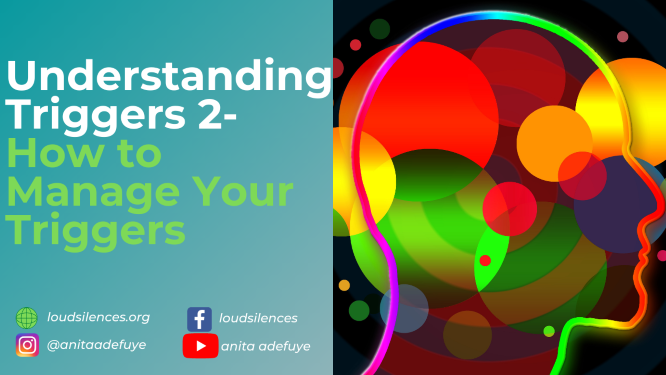Anyone who has been through any type of trauma may have experienced or will experience ‘being triggered’. But I have come to learn that not everyone knows how to manage these triggers when they occur, more so being proactive about it. In my last post, I wrote about understanding triggers, now let us learn how to manage triggers.
Managing triggers may sound very simple, but they may not be as easy as they sound, however, it is completely doable. You will just need to give yourself time to understand yourself and your patterns in determining what works best for you. I will split this into three main parts on how to manage your triggers: pre-trigger, ‘trigger-crisis’ and post-trigger.
Managing Yourself Pre-Trigger
- Understand your triggers: Pay attention to the things that cause you triggers. In the last post, we talked about internal and external triggers. Are your triggers more internal (such as fear, anxiety, panic) or external (environments, certain people and places). Do they occur at certain times of the day, month? How about maybe around specific seasons? For example, I noticed the birth and death anniversaries of my parents and brother are triggers for me, including Christmas (my dad died a little over a week to Christmas). I got depressed and overwhelmed a lot around these periods. Problem is they always snuck up on me, which leads to the second thing.
- Name and Prepare for your triggers: Once you can pinpoint your triggers, name what you feel when they set in (for example, panic or depressed), then prepare for it. As mentioned earlier, the triggers I experienced used to sneak up on me, but once I understood the dates and time, I prepared. One thing I did was:
- Initiate the thoughts myself rather than let it come in haphazardly. For instance, I would think ahead of things I am grateful for about the lives of my loved ones who had passed and those still here with me. This sort of ‘redirected my feelings’ and I was better prepared when the negative feelings came.
- Engage your support system: Talk to at least one person whom you trust who can tell behavioral or psychical signs in you, and if need be, stop it in its tracks. For example, I start to get irritated for no reason. Sometimes, my husband calls me out on it, and I know I need to scale back on stress.
- Decide on a ‘happy place’: This can be a person, place, thing or memory that brings you so much joy. For me, my family is my happy place. More to come on this.
Managing Yourself During a Trigger-Crisis
The steps to manage yourself in this sounds the simplest, yet the hardest. It is kind of like trying to cure a sickness rather than working to prevent it. Takes more effort (energy). But here are some things that can help:
- Admit to yourself that you have been triggered and acknowledge the feeling. This is like gliding with the wind, rather than fighting against it.
- Practice deep-breathing (this helps calm your nerves)
- If the trigger was a familiar object, close your eyes and combine it with #2
- If you can find an object, shift focus to it.
- Picture your ‘happy place’: This is why it is important to decide the happy place before a crisis. In the middle of the crisis, it is easier to ‘go there’ when it is pre-determined.
- Call someone who can help you keep calm or remind you of these steps
- Have an internal affirmation: This can be anything. My go-to was “Jesus help me”. Also, muttering something like “this is not real” can help too.
Managing Yourself Post-Trigger
- Relax: Do not try to rush off to the next thing. Your body has just gone through stress. Stress is not the next thing it needs.
- Journal: Again, do not try to do this right after a trigger-crisis. But not too far either that you forget. Write down all you can remember (what helped and what didn’t). Soon enough, you will notice a pattern and that can help you be better prepared next time.
In addition to the above, the following are also ways of managing triggers:
- Exercise: this helps balances hormones in your body and reduces stress. Personally, I find, stress is my number one undoing.
- Eating clean: Also hormone related, but you feel better energy overall, which helps.
- Therapy: I have personally never undergone therapy, but it definitely can work. Depending on how severe it is, it’s probably advisable to see a professional.
- Have a Support System: whether it is someone (people) actively praying for you or who you can call when triggered, you need positive and compassionate people around you.
- Meditation & Prayer: I am a Christian, and this is by far what worked the most for me. Engaging the truth of God’s Word for me through mediation, confession and prayer was and continues to be the best thing for me. If you have no relationship with Christ, I encourage you to re-think (and feel free to send me a message)
So there it is people, these are some ways you can manage triggers, and/or help someone you know experiences such. I must say that I am not a psychologist, or a therapist. These are drawn from my personal experience dealing with triggers and what worked for me overtime. I know first hand triggers and the experience they bring can get in your way of living life to the fullest, but it does not have to be that way.
What have you tried, did it work? Share with me me in the comments below.

Leave a Reply